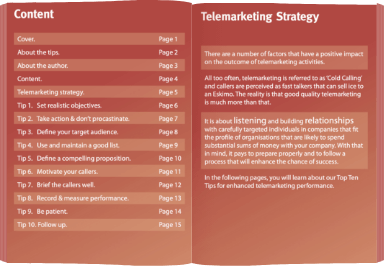The key to effective and successful telemarketing lies in the ability of the caller to build rapport quickly, to engage through relevant conversation that meet buyers’ needs not the seller’s preconceived notions.
But how does a telemarketer do this effectively? Below are our tips for successful telemarketing calls:
The First Few Seconds are Crucial
I probably don’t need to emphasise this but we all know that we have only a few seconds to make an impression. This is magnified on a call. Especially if that call sounds like the 20 other cold calls the prospect has received this week. You have to differentiate the call and it’s equally as important to differentiate yourself as it is to differentiate your company, brand and products. So, give thought to how you come across in those crucial first 10-20 seconds or you’re unlikely to get another 10 seconds from your prospect.
Understand Customer needs and Challenges
Telemarketers need to understand that prospects don’t care about them. They only care about their needs and their challenges. What keeps them up at night? What solutions do they need? When you understand these and understand that’s what they want to be engaged upon, you will kick off your call in a more productive fashion.
Don’t use Tired Scripted Telesales speak
“How are you today?” doesn’t cut it. They know you don’t mean it and don’t care. So don’t show them you’re a sales caller from the start. Start with something that puts them at ease. Refer to likely challenges that resonate with them. Avoid a long list of your services. It’s boring and shows you aren’t interested in them
Prepare your Opening Statement in Advance
But make sure it doesn’t sound scripted and stilted. It should flow, be succinct, relevant, genuinely interesting and ideally related to some challenge or need.
Belief and Motivation are key
They say ‘if you think you can you will and if you think you won’t you will most certainly fail. That is definitely true of telemarketing. Belief and self-motivation count. Motivated callers achieve more. Those that believe that they will smash their targets generally do. So, find that all important motivation and get on the phone.
Get the Tone Right
Think about how you come across. Intonation is key. Emphasis and good intonation on the phone demonstrate to a buyer that your company and your products and services are worthy. If you sound tired, dull and downbeat how will you ever motivate a buyer? You also shouldn’t sound like you’ve just inhaled helium from a balloon or you’re the announcer on XFactor but you do need to sound like you have genuine conviction in what you’re offering.
Mind Your Language
You have to judge your audience and match them as far as possible. That is likely to differ from sector to sector and job role. A call to a barrister to discuss compliance is likely to be different to one to a PA to discuss corporate hospitality and the company Xmas party. What is true however is that both matching and mirroring are key. I favour a relaxed but professional approach to most calls. So, rather than saying that we are phoning ‘to ascertain whether they might have a need to control travel expenditure’, I would prefer to say to a travel manager ‘we’re dealing with a fair few travel managers who’re telling us that they’re fed up with travel expenditure being out of control’ . You may disagree with the exact nature of the above but the principle is the important thing. Natural language rather than telespeak will ensure a better call flow and greater engagement and rapport.
Ask Good Questions
Good questions have two main benefits. First, it allows the seller to gather essential information from the prospect. Without information, it is very tough to have a genuinely useful sales conversation. The only way to gather these details is to ask questions. Not like a research survey but ones that are relevant and encourage the prospect to divulge information freely. Second, it prevents the call from gabbling and overdoing the sales pitch. The more good questions, the better the call.
Less Talk More Listening
We have two ears and one mouth and should use them in that proportion. If you get past the first few seconds on the call, you need to ask the questions that keep the call flowing. But how often do we jump in and not listen to the answers since we are planning our next statement? The more you listen for understanding before replying, the more you will show interest and the buyer will engage with you.
It’s Two-Way not One Way
Connected to the telemarketing tip above, sometimes telemarketers need to be reminded that they aren’t on stage acting in front of an audience. They need to remember that effective telemarketing calls are conversations. They are dialogues not monologues. Therefore, less pitching and more conversations is the order of the day for a good telemarketing call.
GSA is a London based new business development and telemarketing consultancy with an office in Manchester. We offer new business development and marketing strategy, senior-level telemarketing services and telemarketing training to ensure that clients generate more new business and deliver ROI.
If you’d like to find out how GSA Business Development can help Generate Growth for your Business or book one of our new business development and marketing strategy workshops, contact us now on 0845 658 8192 or send us an email.






